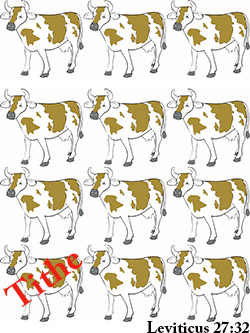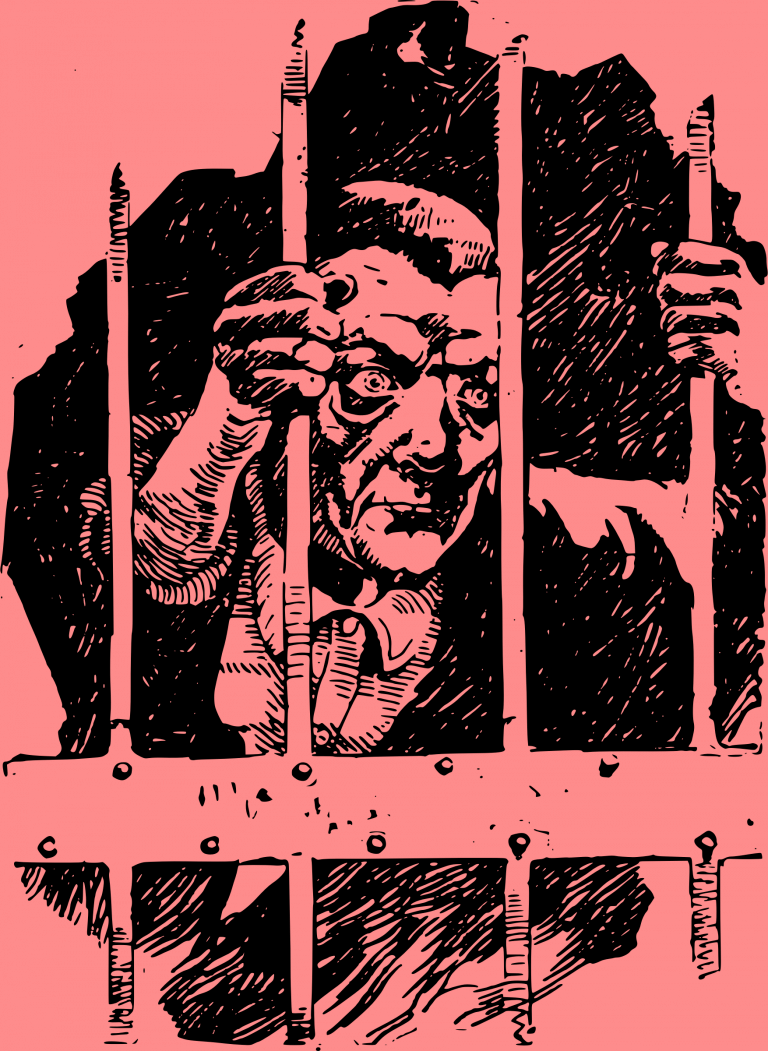The King and the Innocent Man
After 41 years, 6 months, and 13 days, the king was informed of the innocent man.
The king was filled with consternation. It was not only contrary to the laws of his kingdom, to his very own decrees, in fact. It was contrary to the laws of God. In fact, it was, fundamentally contrary to nature!
So he turned to his courtiers and announced: “I’m going to the royal prison.”
Now the courtiers were filled with consternation. The king had never visited the royal prison. There was no precedent. The royal guard wondered how they could keep the king safe in such a place. The royal chef was certain the kitchen facilities would be inadequate. It was, after all, a prison.
But the king was an absolute ruler, deriving authority from God himself, and the courtiers dared not tell him he couldn’t visit the prison. It was, after all his royal prison, even though nobody had ever imagined he would actually be there.
So quite a train of horses, carriages, and wagons carrying supplies left the palace, and they delivered the king to the royal prison.
Once the governor of the royal prison got over the shock of seeing His Majesty actually inside his royal prison, he inquired as to what His Majesty required of his loyal governor.
“We wish to see the innocent man,” announced the king.
The governor of the prison didn’t know what to say to that. He knew very well which man the king was referring to. But he wasn’t certain if he could admit it without calling the king a liar. It was firmly entrenched in the law of the kingdom that no person who was incarcerated in the royal prison was innocent.
“Your majesty,” said the governor. “Nobody can be imprisoned here if he is innocent.”
“Don’t waste our time,” said the king. That he did not recognize and take account of the governor’s problem showed just how deep his consternation was. He was normally very thoughtful and considerate of the efforts his courtiers made to respect him and the laws of his kingdom.
“The man who claims to be innocent is out with a work crew, breaking rock. He will be sent for immediately.”
Though the men hurried, it was a full hour before the innocent man was brought in before His Majesty. He bowed with his forehead to the ground quite properly. When he was told to rise, he stood respectfully.
“You claim you are innocent,” said the king.
“Yes, your majesty,” said the innocent man.
“Yet you are here in the royal prison, where the law says no innocent man may be incarcerated. It is an intolerable contradiction. Do you deny the law?”
“I do not deny the law, your majesty. I simply know that I am innocent.”
“Can you explain this?”
“No, your majesty, I cannot.”
“So you are innocent?”
“Yes, your majesty.”
“Yet you have been here, living a contradiction for more than 40 years.”
“41 years, 6 months, and 13 days,” said the innocent man.
“You were convicted of a brutal murder by a jury of your peers?”
“Yes, your majesty.”
“When you refused to accept the verdict, your life was examined, is that not so?”
“Yes, your majesty.”
“And they found that you had lost eight children and your first two wives to disease, you had suffered poor crops half of your years as a farmer. Further, in the month prior to the crime, people around you suffered an extraordinary number of catastrophes. Is that not clear evidence that you are cursed by God and not innocent?”
“I don’t know about that, your majesty. I only know that I am innocent.”
“When you refused to accept the verdict of the priests who examined your life, you were subjected to ordeal by being cast into the sacred lake.”
“Yes, your majesty.”
“And the lake failed to receive you. In fact, you floated for an extraordinarily long time. And you still maintained your innocence.”
“Yes, your majesty.”
“You were tortured for 30 consecutive days, and still you refused to admit your guilt.”
“That is true, your majesty.”
After you had spent 20 years in the royal prison, you were offered pardon, as is our royal will. All that was required was that you admit your guilt. Yet for the last 20 years you have refused our grace!”
“For the last 21 years, your majesty.” It could have been insolent, that correction, but the man sounded so respectful.
“Well,” said the king, “I will now give you an opportunity to correct this apparent flaw in the state of nature. I command you as your king to admit your guilt, and even now you will receive our grace.”
“But, your majesty, the law of the kingdom also allows no occasion on which one is permitted to testify falsely. The law is also clear that if I admit my guilt, it is regarded as sworn testimony. And the fact is that I know that I am innocent.”
The king was stumped. He would have been angry but he was too puzzled. Besides being the law of the land, it was simply nature, the way things worked! A person was found guilty by a jury. Yet a jury could be mistaken. But that person could appeal to a check of the omens. If the omens went against him, he could request a trial by ordeal. If he failed all of this, the Divine verdict was clear—he was guilty. After a certain portion of his sentence was fulfilled, he would be offered the opportunity to accept the king’s grace and be relieved. Everyone accepted their guilt and his grace!
He was both just and merciful. He had eliminated the penalty of death. There was nothing more he could or should do!
He turned back to the innocent man. “You are a contradiction. …”
Endings:
- Therefore I declare that you are not a man. You are, in fact, a demon, and as such may be eliminated. You will be sent from this place stripped of the protection of the laws you contradict.
- Therefore I declare your trial, omens, and ordeal must be null and void and that those who carried them out are guilty of fraud against God and the king. You are free!
- Therefore I declare that there may be one, and only one, exception to the law. You are that exception. You are free!
- Therefore I find that you are the most stubbornly wicked of all men, compounding brutal murder with unrepentant lying and an endurance that could only be possible with the help of the Evil One. You will remain in prison for life, and I declare you the guiltiest of all despite your denial.
What do you think the king will do?
Discover more from The Jevlir Caravansary
Subscribe to get the latest posts sent to your email.




Much of the answer depends on the purpose of your story. If your intent is an allegory on the Grace and Justice of God, than none of the four endings is quiet right for the man would indeed be guilty. His refusal to recognize he has sinned will deny him grace because he sees no need to receive grace. He will certainly end in a place striped of any protection, but not declared anything other than an unrepentant man.
If this is simply a secular tale, then any of the four endings is possible as well as others not given and the man may or may not actually be guilty of the crime charged.
If this is to indicate our laws are often convoluted, confusing and contradictory, than that is certainly true.
I should have added:
5. None of the above
Actually I thought about writing it as a spiritual tale, but then it would be fairly obvious.
But I actually had something else in mind. What makes us certain of a particular result? What makes us absolutely certain we're right?
Ending #3 and he is the exception to the rule so must go free. For thought, if he was guilty, and all the bad that had happened to him with the death of his wife and children, ruined crops etc, he may have not wanted to say he was guilty and accept a pardon. He may have enjoyed his prison life. In a spiritual sense, some are just too stubborn to admit they are sinners and to accept the Lords pardon. Good story!
and
The story isn't entirely parallel to Job, but there were some connections in my mind.